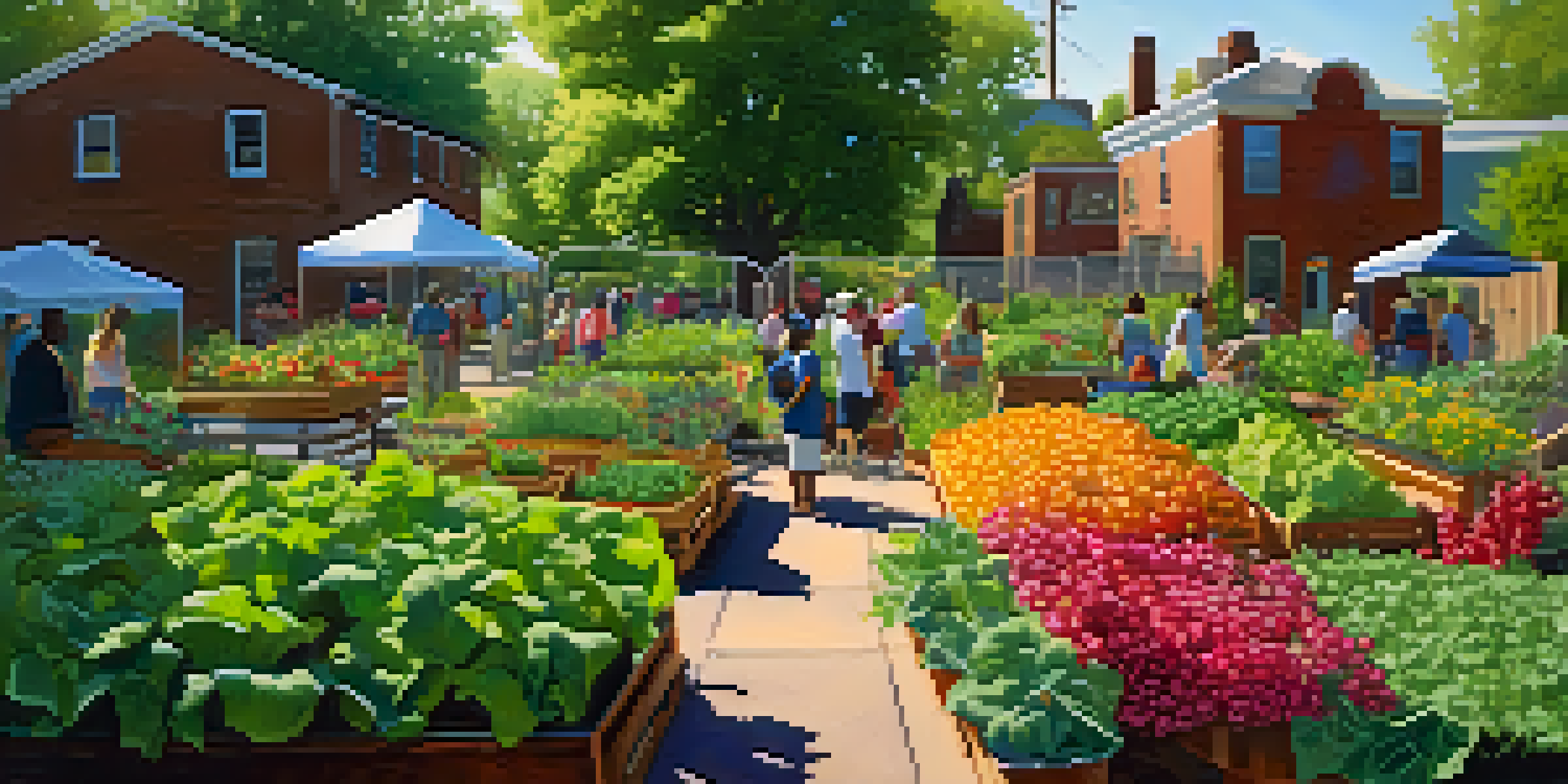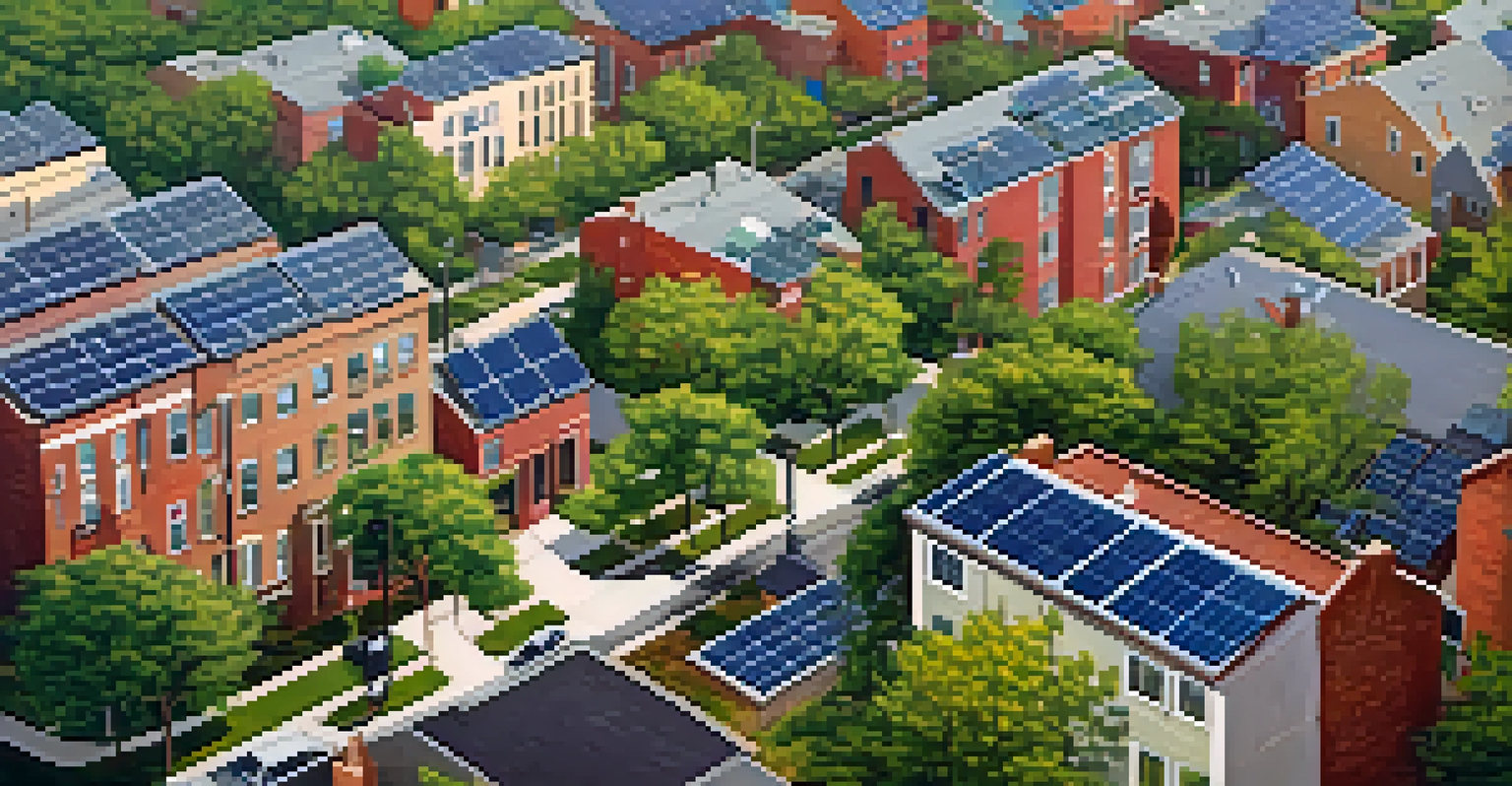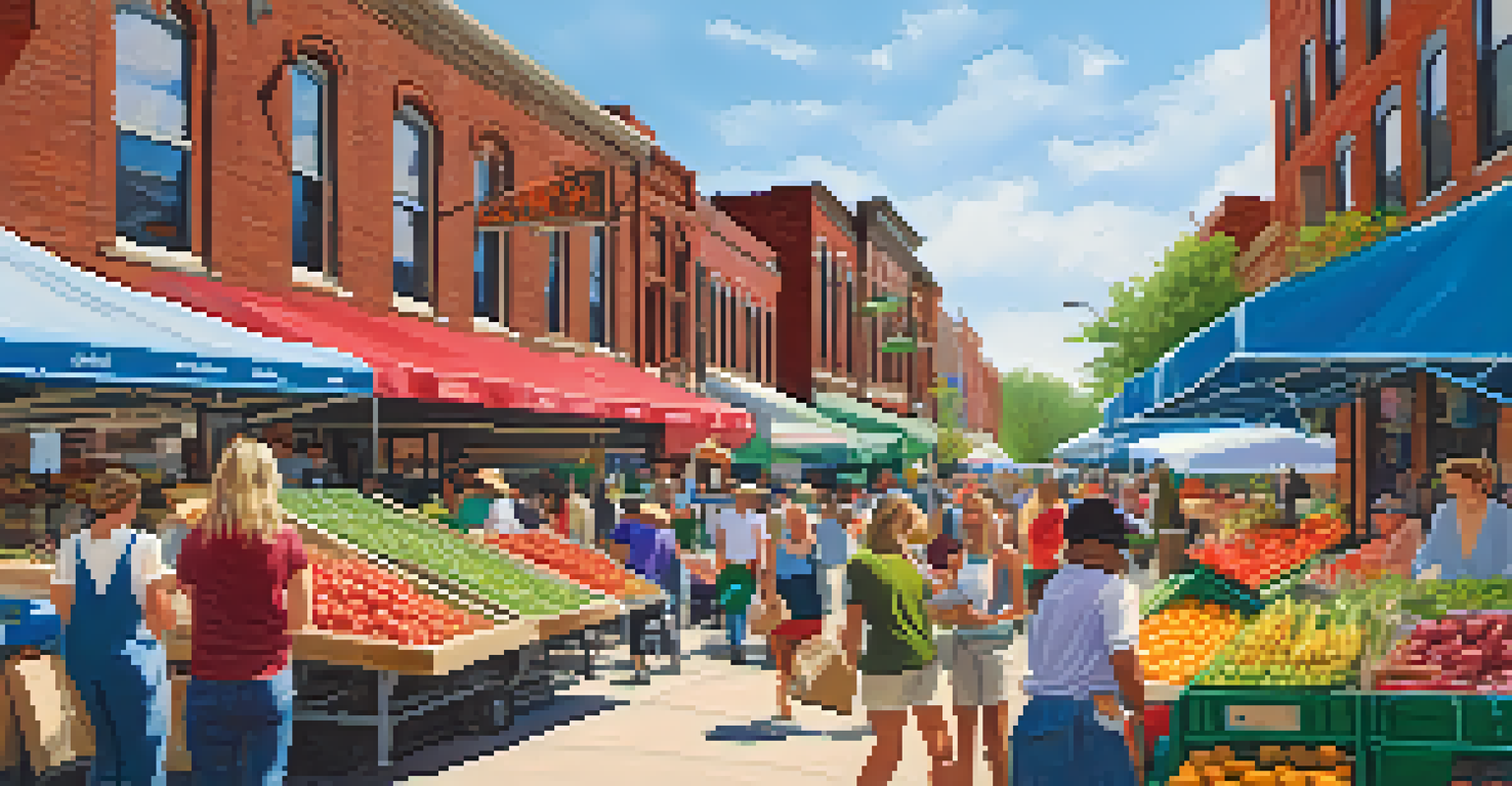Sustainability Efforts in St. Louis Neighborhood Communities

Community Gardens: Growing Together for a Greener Future
In St. Louis, community gardens are sprouting up in neighborhoods, bringing residents together to cultivate not just plants, but relationships. These green spaces provide fresh produce, promote biodiversity, and enhance urban aesthetics, proving that sustainability can bloom in unexpected places.
The greatness of a community is most accurately measured by the compassionate actions of its members.
Take the Old North St. Louis neighborhood, for example, where residents transformed vacant lots into thriving gardens. This initiative not only improves local food security but also fosters a sense of pride and ownership among community members. It's a beautiful reminder that sustainability often starts at home.
Moreover, these gardens serve as educational hubs, teaching children and adults alike about the importance of sustainable practices. From composting workshops to seed-saving events, they bring knowledge and resources directly to the community, empowering individuals to make environmentally conscious choices.
Renewable Energy Initiatives: Powering the Future
St. Louis neighborhoods are increasingly turning to renewable energy sources, such as solar and wind, to power their homes and businesses. This shift not only reduces carbon footprints but also promotes energy independence within the community. More and more residents are installing solar panels, taking advantage of state incentives and lowering their utility bills.

One noteworthy example is the St. Louis Solar Co-op, which allows residents to band together to purchase solar panels at a reduced cost. This cooperative model not only makes solar energy more accessible but also fosters a spirit of collaboration among neighbors. It’s a win-win situation where everyone benefits from cleaner energy.
Community Gardens Foster Connections
Community gardens in St. Louis not only provide fresh produce but also strengthen relationships among residents.
As these renewable energy initiatives gain momentum, they also create jobs in the green sector, contributing to the local economy. By investing in sustainable energy, St. Louis is not just caring for the planet; it's building a resilient community for future generations.
Waste Reduction Programs: Less Trash, More Treasure
Waste reduction is a critical aspect of sustainability, and St. Louis neighborhoods are stepping up to the plate. Through various programs, residents are learning the importance of recycling, composting, and reducing single-use plastics. This collective effort helps divert waste from landfills and promotes a circular economy.
Sustainability is not a choice, it's a necessity. We need to create a world that future generations can thrive in.
In the Tower Grove neighborhood, the community has embraced a 'zero waste' philosophy, encouraging residents to rethink their consumption habits. Local workshops teach skills like upcycling and repairing items, transforming waste into valuable resources. It's a refreshing approach that turns trash into treasure.
These waste reduction initiatives not only benefit the environment but also create a sense of community. Neighbors come together to share tips and resources, fostering connections and building a culture of sustainability that can inspire other neighborhoods to follow suit.
Local Businesses Going Green: A Sustainable Shift
Many local businesses in St. Louis are embracing sustainable practices, recognizing that being green is not just good for the planet, but also good for business. From eco-friendly packaging to sustainable sourcing, these businesses are leading the charge in creating a more sustainable economy.
For instance, a popular coffee shop in the Delmar Loop has switched to compostable cups and sources their coffee beans from fair-trade farms. This commitment to sustainability resonates with customers who value ethical practices. It's a great example of how businesses can play a pivotal role in community sustainability.
Renewable Energy Boosts Independence
St. Louis neighborhoods are increasingly adopting renewable energy sources, enhancing energy independence and reducing carbon footprints.
Moreover, these green businesses often collaborate with local farmers and artisans, supporting the local economy and reducing carbon emissions associated with transportation. As more businesses adopt sustainable practices, they not only enhance their brand but also contribute to a healthier community.
Green Transportation: Moving Towards Sustainability
Transportation is a key factor in urban sustainability, and St. Louis is making strides towards greener options. The city is investing in bike lanes, pedestrian-friendly streets, and public transit improvements to encourage residents to choose eco-friendly travel methods. This shift not only reduces traffic congestion but also lowers greenhouse gas emissions.
The Great Rivers Greenway is a prime example, offering an expansive network of trails for biking and walking. These pathways connect neighborhoods, parks, and businesses, making it easier for residents to opt for cycling or walking instead of driving. It's a sustainable choice that promotes health and well-being.
Additionally, public transportation options are being expanded, with initiatives to make buses and trains more accessible and efficient. By prioritizing green transportation, St. Louis is creating a more connected and sustainable urban environment, paving the way for a brighter future.
Environmental Education: Knowledge is Power
Education plays a crucial role in fostering sustainability within St. Louis communities. Local schools and organizations are implementing programs that teach students about environmental stewardship and sustainable practices. By instilling these values at a young age, they are nurturing the next generation of eco-conscious citizens.
For instance, the Gateway Greening program engages students in hands-on gardening experiences, teaching them about ecosystems, nutrition, and the importance of local food systems. These lessons extend beyond the classroom, empowering students to take action in their own homes and communities.
Collaboration Drives Sustainable Change
Local organizations and residents are uniting to tackle environmental challenges, demonstrating that collective action can lead to impactful sustainability initiatives.
Moreover, community workshops and events offer resources for adults to learn about sustainability, from energy conservation to waste reduction. These educational initiatives create a knowledgeable community that is equipped to tackle environmental challenges together.
Collaborative Community Initiatives: Strength in Numbers
Collaboration is at the heart of many sustainability efforts in St. Louis neighborhoods. Various community organizations and residents are coming together to tackle local environmental issues, demonstrating that collective action can lead to meaningful change. These partnerships amplify their impact and create a sense of unity.
An excellent example is the St. Louis Sustainability Collaborative, which brings together diverse stakeholders to address sustainability challenges. By sharing resources, knowledge, and expertise, they work on projects that benefit the entire community, from tree planting initiatives to clean-up events.

Such collaborative efforts not only enhance the effectiveness of sustainability initiatives but also strengthen community bonds. When people work together towards a common goal, they build trust and camaraderie, creating a more resilient and vibrant neighborhood.
The Future of Sustainability in St. Louis: A Collective Vision
As St. Louis neighborhoods continue to embrace sustainability, the future looks promising. With residents, businesses, and organizations working hand in hand, they are creating a collective vision for a greener community. This shared commitment to sustainability is not just about reducing waste or conserving energy; it's about fostering a culture of care for the environment.
Looking ahead, ongoing initiatives and new projects are likely to emerge, focusing on innovative solutions to environmental challenges. This evolution will require active participation from all community members, encouraging everyone to contribute their unique skills and ideas.
Ultimately, the path towards sustainability in St. Louis is a journey that invites everyone to get involved. By supporting local efforts and promoting eco-friendly practices, residents are shaping a brighter and more sustainable future for generations to come.